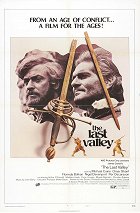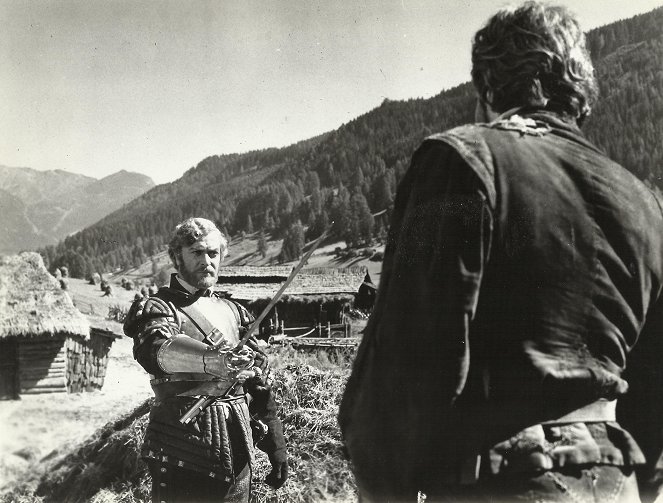Regie:
James ClavellDrehbuch:
James ClavellMusik:
John BarryBesetzung:
Michael Caine, Omar Sharif, Florinda Bolkan, Nigel Davenport, Per Oscarsson, Madeleine Hinde, Brian Blessed, Arthur O'Connell, Yorgo Voyagis (mehr)Streaming (1)
Inhalte(1)
Europa im Jahr 1641: Vogel hat in einem abgelegenen Alpental Zuflucht gefunden, das wie durch ein Wunder vom Dreißigjährigen Krieg verschont geblieben ist. Doch nun droht eine Söldnertruppe das Dorf zu plündern. Vogel kann den Hauptmann auf seine Seite ziehen und das Dorf samt Bewohner vor der Zerstörung durch die Fremden retten. Doch die neuen Herren lassen keinen Zweifel, wer das Sagen hat. Nichts und niemand ist mehr sicher. Die Überwinterung in dem Dorf wird zur Zerreißprobe zwischen den Mächtigen des Dorfes und der Truppe. Als sich schließlich des Hauptmanns eigene Männer gegen ihn erheben, scheint das Schicksal des Dorfes besiegelt… (Verleiher-Text)
(mehr)Kritiken (4)
I don't know whether to be more shocked that James Clavell also directed or that he was as good at directing as he was at writing.
()
Large studios have never been characterized by meticulousness when it comes to historical realities, and this can also be applied to The Last Valley. Many details, but also more fundamental aspects of the thinking and actions of the characters suffer from a lack of historical accuracy, and it is simply the screenwriter's construct in the style of "these things will sell well in the second half of the 20th century and evoke the appropriate emotions, so we'll put them in there." Just to give an example, an officer would not publicly admit to his factual position as an atheist during a time of religious wars and boundaries with heretics - if only because he would lose the respect of his subordinates and give his opponents a powerful weapon to gain control over the village. Nevertheless, this is one of the significantly better films that were created at that time on a historical theme. The anti-war ethos is evident, there are interesting characters in the film, and the dramatic conflict functions. The clash between faith and political power on one hand, as well as the conflict between idealism and cynical pragmatism, provide film fans with many interesting scenes and catharsis. Moreover, the film has a star-studded cast in the form of Michael Caine and Omar Sharif. However, I cannot shake the impression that Czech director Karel Zeman managed to depict the chaos of war in his The Jester's Tale more creatively, with a sense of humor and irony, all at a fraction of the cost. On the other hand, James Clavell catered to fans of adventure spectacles and incorporated not only many mercenary skirmishes in his film but also a bloody battle for a large city. Overall impression: 75%.
()
Es gibt nur wenige historische Filme, die man sich anschaut und denkt: "Ja, so musste es damals wirklich sein." Das Vergessene Tal ist einer von diesen Filmen. Den Dreißigjährigen Krieg zeigt er als einen Konflikt, der den Kontinent in zwei große und mehrere kleinere Lager gespalten hat und Menschen gegeneinander aufgehetzt hat, die sich bis dahin nur um ihr eigenes Haus und Feld gekümmert haben. An dem Sinn von all dem konnte jeder zweifeln. Er musste aber auch damit rechnen, dass wenn ihm jemand die Kehle durchschneiden will, dass ihn daran nichts hindern wird. Ungefähr so denkt die Figur von Michael Caine. Dem einen oder anderen kann es seltsam vorkommen, dass gerade er die Rolle vom Hauptmann bekommen hat. Seine erste Szene zerstreut aber alle Befürchtungen (ganz zu schweigen von der letzten Szene). Das Vergessene Tal hat aber nicht nur Caine, sondern auch den tollen Gegen-/Mitspieler Omar Sharif und den exakt spielenden Nigel Davenport alias Gruber. Clavells Regie hat mich überrascht – die Kämpfe sind kompromisslos hart und dreckig, Szenen wie z. B. die Pestgrube oder die Hinrichtung der Hexe (seit Hexenjagd die beste Szene dieser Art, die ich gesehen habe) unvergesslich. Und dann ist hier natürlich John Barry. Ohne seine Spitzenmusik hätte dem Film ein Großteil seiner tollen Stimmung gefehlt. Falls Ihnen Barrys Der Löwe im Winter oder Maria Stuart, Königin von Schottland gefallen, hören Sie sich auch diesen Soundtrack an. In seinem Genre ist er unbestreitbar perfekt. Das Vergessene Tal hat fünf Sterne verdient.
()
If a film that's over fifty years old can still captivate me with its message today, you know the creators did something right. The main takeaway from the film was loud and clear: war is absolute filth. And I couldn't agree more. But what struck me even more was the secondary message that emerged from the religious discussions. When I say I agree with it wholeheartedly, it barely scratches the surface of my feelings. Let me be blunt — I've always viewed religion as the epitome of filth, and the Thirty Years' War perfectly illustrates why. Imagine this: two opposing sides, supposedly both believing in the same god, plunging Europe into three decades of chaos — killing, raping, looting, and destroying. If this was all happening in the name of a god, well, that god would have to be a real jerk. And let's not forget about the devil. I have no doubts about his existence; we all carry our own devils within us, ready to wreak havoc or at least make life miserable for others when the opportunity arises. The scary part? It's not some supernatural being — it's us. No excuses, except for the religious ones. Then you blame it all on Satan's impure deeds, burn your neighbor for having a wart on her nose and a black cat on her couch, and suddenly, the colors of your world are clear and radiant again. That's the essence of this film, or at least how I interpret it. And what's unnerving is that despite its age, the film still feels uncomfortably relevant today. / Lesson learned: If you see a priest, toss a stone before you find yourself burning at the stake. 4*+
()

